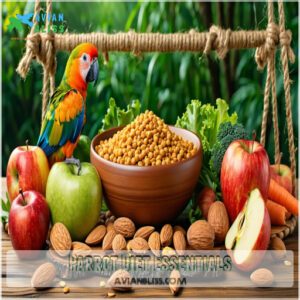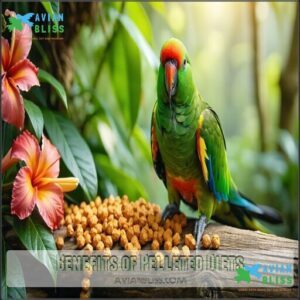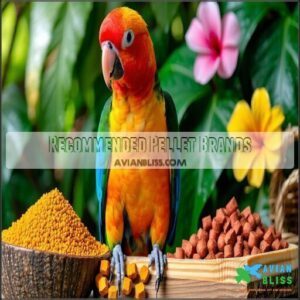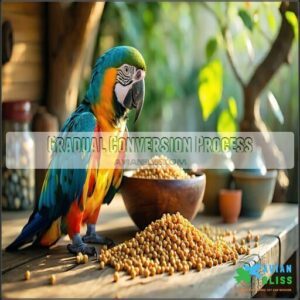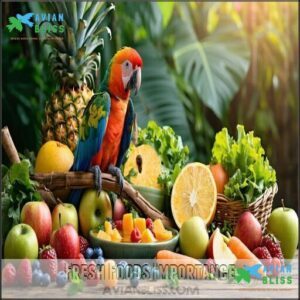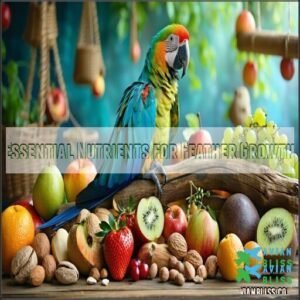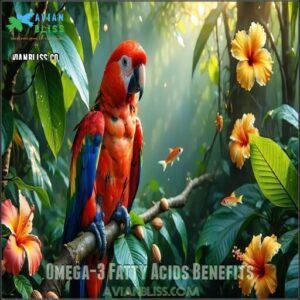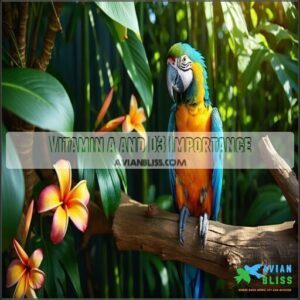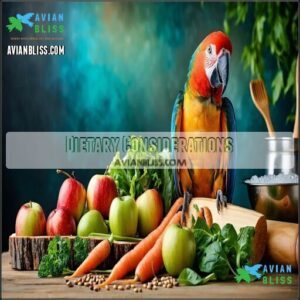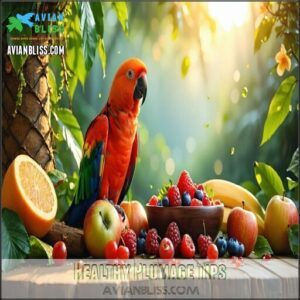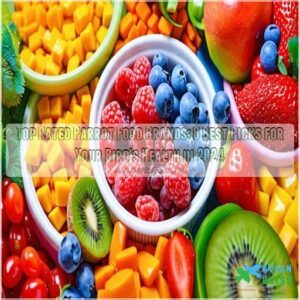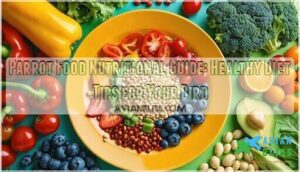This site is supported by our readers. We may earn a commission, at no cost to you, if you purchase through links.

Ensuring a balanced diet that includes high-quality pellets, fresh veggies, and limited fruits is important. A 2:1 calcium-phosphorus ratio is important, and vitamin D3 aids absorption.
Fresh foods like raw or steamed veggies and whole grains support digestive health. By feeding your parrot a nutrient-rich diet, you’ll be supporting their overall health and promoting beautiful, vibrant feathers.
Now, let’s explore the secrets to achieving that stunning plumage, starting with the right combination of high-quality pellets and fresh foods, which is key to a balanced diet.
Table Of Contents
- Key Takeaways
- Parrot Diet Essentials
- Pellets for Parrots
- Fresh Foods Importance
- Feather Health Nutrition
- Dietary Considerations
- Healthy Plumage Tips
- Frequently Asked Questions (FAQs)
- How can I improve my parrot feathers?
- What is the number one diet fed to parrots?
- What promotes bird feather growth?
- What are the best foods for molting parrots?
- Can parrots eat human food daily?
- How often should I weigh my parrot?
- What toys promote parrot beak health?
- Do parrots need regular nail trimming?
- Can parrots see colors like humans do?
- Conclusion
Key Takeaways
- Feed your parrot a balanced diet with high-quality pellets, fresh veggies, and limited fruits to support vibrant feathers and overall health.
- Avoid seed-based diets as they’re high in fat and lack essential nutrients, which can harm your parrot’s plumage.
- Ensure a 2:1 calcium-phosphorus ratio and include vitamin D3 for proper nutrient absorption and feather health.
- Offer omega-3 fatty acids, vitamin A, and protein-rich foods like legumes and leafy greens to promote feather growth and shine.
Parrot Diet Essentials
You’re taking the first step toward giving your parrot a healthy, vibrant plumage by learning about the essentials of their diet.
By understanding what nutrients your parrot needs, you can create a balanced diet that includes pellets, fresh foods, and limited treats to keep their feathers strong and shiny.
Seed-Based Diets Inadequacies
Feeding your parrot a seed-based diet can lead to nutritional deficiencies, health problems, and low nutritional quality due to high fat content, providing incomplete nutrition that harms plumage health and feather health.
A seed diet for parrots is a less desirable choice for superior parrot nutrition because it makes the bird more prone to various health issues.
A parrot food nutritional guide offers valuable insights into creating a balanced diet.
Importance of Pelleted Diets
How can you provide your parrot gets complete nutrition?
Pelleted diets offer lifespan benefits, health improvements, and a balanced diet, making them a great choice for a parrot diet.
Supporting healthy parrot plumage and plumage health through various conversion methods to a pellet diet for parrots.
Role of Fresh Foods
You’ll want to balance pellets with a fresh variety of veggies and fruits for ideal nutrient balance, supporting digestive health and healthy parrot plumage.
Making meal planning a breeze with the right mix of food quality and parrot vitamins.
Pellets for Parrots
You’re looking for a reliable way to keep your parrot’s plumage healthy, and pellets can be a great option.
By choosing the right pellets, you can provide your parrot with a balanced diet that supports their overall health and well-being.
So, let’s explore the benefits of pelleted diets for your feathered friend.
Benefits of Pelleted Diets
You’re learning about parrot diet essentials.
Now, let’s explore pellet benefits:
- Improved feather growth
- Balanced nutrition
- Reduced health issues, with high-quality pellets supporting healthy parrot plumage through proper diet conversion and pellet nutrition, which leads to balanced nutrition.
Recommended Pellet Brands
You’ll find top pellet brands like Roudybush, Lafebers, and Harrisons offer high nutritional value.
Many parrot owners rely on high quality pellets for their birds’ health.
| Brand | Ingredients | Nutritional Value |
|---|---|---|
| Roudybush | Natural | High |
| Lafebers | Wholesome | Balanced |
| Harrisons | Organic | Excellent |
Gradual Conversion Process
You’re introducing pellets to your parrot’s diet. Here are conversion tips:
- Mix pellets with seeds
- Reduce seed portions
- Offer pellets as treats, for a gradual diet change and healthy plumage.
Fresh Foods Importance
You’re taking an important step toward ensuring your parrot’s healthy plumage by learning about fresh foods.
By incorporating a variety of fresh foods into your parrot’s diet, you’ll be providing essential vitamins, minerals, and fiber that can help support their overall health and well-being.
Vegetable Variety and Benefits
You’ll discover a rainbow of options for your parrot’s vegetable diet, including leafy greens, cruciferous vegetables, and root vegetables.
Offering a colorful choice for healthy plumage, with seasonal variety being key to a balanced vegetable preparation for parrots.
Fruit Limitations and Recommendations
When feeding fruits to your parrot, remember portion control is key.
Opt for low-GI fruits like berries, limiting treat frequency. A varied fruit diet provides essential nutrients, including vitamin A, supporting overall parrot health and plumage, but avoid overfeeding to maintain a balanced nutritional value.
Parakeets can enjoy watermelon in moderation, but the rind and seeds should be removed to ensure a safe and healthy fruit diet.
Calcium and Phosphorus Balance
You balance calcium intake and phosphorus levels for your parrot’s bone health, aiming for a 2:1 mineral balance, with vitamin D3 aiding absorption, ensuring ideal parrot health and feather health through proper nutrient ratio management.
Proper parrot nutrition is essential for maintaining healthy plumage and overall well-being.
This approach to parrot nutrition is crucial for the bird’s overall health.
Feather Health Nutrition
You’re about to learn the secrets to promoting healthy plumage in your parrot through proper nutrition.
By understanding the essential nutrients for feather growth, such as omega-3 fatty acids, vitamin A, and D3, you can create a balanced diet that supports your parrot’s overall health and well-being.
This knowledge will help you make informed decisions about your parrot’s diet, ensuring they receive the necessary nutrients for optimal health, with proper nutrition being key to their well-being.
Essential Nutrients for Feather Growth
You’ll need protein sources, vitamin balance, and mineral supplements for parrot feather health.
Amino acids, calcium, and vitamin A support feather growth, ensuring your parrot’s plumage stays healthy and vibrant.
With omega-3 fatty acids playing a key role in feather nutrition.
Omega-3 Fatty Acids Benefits
You’ll find omega-3 fatty acids support parrot feather health, reducing inflammation and promoting healthy growth, making them a key nutrient for improving parrot plumage.
The parrot’s diet should include omega 3 supplements to make sure they receive adequate nutrition for healthy feathers, with sources including fatty acid rich foods for best feather growth and overall parrot health.
Vitamin a and D3 Importance
You’re boosting feather growth with Omega-3s, now add Vitamins A and D3 for a nutrient balance that supports plumage health.
Ensuring your parrot’s feathers shine with a healthy glow, aided by vitamin A and D3 supplements for maximum parrot feather health and overall well-being, with Vitamins A and D3 being crucial.
Dietary Considerations
You’re taking the first step to create a balanced diet for your parrot, and it’s great that you’re considering their nutritional needs.
By managing seed consumption, balancing vitamins and minerals, and offering fresh food portions, you can help your parrot achieve healthy plumage and overall well-being.
Balancing Vitamins and Minerals
You manage nutrient ratios to prevent vitamin deficiencies and mineral excesses, ensuring your parrot gets enough calcium, vitamin A, and vitamin D3, while avoiding toxicity risks from excessive Omega-3 fatty acids, a delicate balance for ideal health.
Maintaining proper parrot vitamin supplements is essential for their overall well-being, and it requires careful consideration to avoid toxicity risks.
Managing Seed Consumption
You’re introducing pellets to reduce seed consumption.
Seed control is key, so limit seed treats.
A parrot feeding guide recommends a pellet diet with healthy alternatives, ensuring nutrition balance.
This helps your parrot thrive, making seed diet shifts smoother with pellet introduction and nutritious seed alternatives.
Understanding bird seed nutrition is essential for a balanced parrot diet.
Fresh Food Portions and Variety
You’re balancing seed consumption, now focus on fresh food portions.
- Fresh vegetables daily
- Limited fruits
- Cooked grains
- Legumes
- Raw nuts
for a nutrient-balanced diet, ensuring your parrot’s dietary needs are met with a variety of fresh options.
Healthy Plumage Tips
You’re taking the right steps to guarantee your parrot’s healthy plumage by focusing on a balanced diet and proper care.
By following these healthy plumage tips, you’ll be able to provide your parrot with the necessary nutrients and environment to maintain vibrant, shiny feathers and overall well-being.
Stress Reduction and Exercise
You reduce stress in your parrot through flight exercises, social interaction, and environmental enrichment.
Like toy rotation, these activities support feather growth and overall well-being.
Using calming techniques to minimize stress and promote healthy parrot behavior.
Sunlight and Sleep Importance
You maintain your parrot’s healthy plumage by providing sunlight exposure and maintaining sleep patterns.
- Regulate daylight cycles
- Monitor rest duration
- Balance circadian rhythms
- Offer vitamin D supplements for parrot health and feather health, supporting parrot plumage.
Regular Baths and Grooming
Parrots appreciate a good spa day, too! Regular baths keep their feathers clean and healthy. Aim for a few baths a week, increasing frequency if your parrot enjoys it.
Consider these best feather care tips for maintaining healthy plumage. Besides feather cleaning, parrots also benefit from beak trimming and nail care. A tidy beak and talons guarantee parrot’s comfort and safety.
Here’s a quick overview of the grooming basics:
| Grooming Aspect | Benefits |
|---|---|
| Bath Frequency | 2-3 times a week, or more if your parrot enjoys it |
| Feather Cleaning | Removes dirt and debris, keeping feathers soft and shiny |
| Beak Trimming | Ensures proper beak shape and function, aiding in eating and preening |
| Nail Care | Prevents overgrowth, which can cause discomfort and difficulty perching |
| Plumage Maintenance | Supports feather health and improves overall appearance |
This reorganization improves readability by grouping related concepts together, making it easier to follow the text and understand the importance of parrot grooming and **
Frequently Asked Questions (FAQs)
How can I improve my parrot feathers?
You can improve your parrot’s feathers with a balanced diet, including pellets, veggies, and fruits, and providing essential nutrients like omega-3 fatty acids and vitamin A for healthy growth.
What is the number one diet fed to parrots?
You’ll find that pellets are often the number one diet fed to parrots, providing a balanced mix of nutrients for ideal health and well-being, according to avian experts and veterinarians.
What promotes bird feather growth?
A balanced diet packed with protein, calcium, vitamins A, D, and E, plus omega-3s, boosts feather growth.
Add veggies like carrots, sweet potatoes, and leafy greens.
Regular baths and sunlight also work wonders!
What are the best foods for molting parrots?
Molting’s tough, but a mix of high-protein foods like cooked legumes, quinoa, and eggs paired with vitamin-rich veggies (carrots, sweet potatoes) fuels feather growth.
Toss in Omega-3 sources like chia seeds for extra shine!
Can parrots eat human food daily?
Yes, parrots can eat some human foods daily, like cooked grains, steamed veggies, or unsalted nuts.
Just skip anything sugary, salty, or processed—think fresh, wholesome options that mimic their natural diet.
How often should I weigh my parrot?
Weigh your parrot weekly to track subtle weight changes, as they can signal health issues.
Use a digital gram scale for accuracy.
Weighing at the same time each day maintains consistent results and better monitoring, which can help identify subtle weight changes.
What toys promote parrot beak health?
Opt for chewable toys like natural wood blocks, coconut shells, or cuttlebones.
They keep your parrot’s beak strong and trim while satisfying their chewing instincts.
Rotate toys often to prevent boredom and encourage exploration.
Do parrots need regular nail trimming?
Parrots need regular nail trims to prevent overgrowth, which can cause discomfort or difficulty perching.
Check their nails monthly—if they’re snagging or curling, it’s time.
A professional can guarantee safe trimming.
Can parrots see colors like humans do?
Birds see a vibrant world, even better than we do!
They perceive more colors, including ultraviolet light, thanks to extra cone cells in their eyes.
So, your parrot’s colorful feathers aren’t just for your admiration!
Conclusion
Caring for your parrot’s plumage isn’t rocket science—it starts with the best diet for parrot healthy plumage.
Focus on high-quality pellets, fresh veggies, and the right balance of nutrients like calcium, phosphorus, and vitamin D3.
Limit seeds and sugary fruits, and offer variety to keep meals exciting.
Pair this with sunlight, exercise, and regular baths to keep feathers vibrant and strong.
A little effort goes a long way in keeping your feathered friend looking fabulous!
- https://bestfriends.org/pet-care-resources/best-parrot-diet-and-toxic-foods-avoid
- https://www.kaytee.com/learn-care/pet-birds/what-do-pet-parrots-eat
- https://avianenrichment.com/index.php/learn/physical-needs/diet-nutrition/where-we-go-wrong
- https://birdtricksstore.com/blogs/birdtricks-blog/the-6-components-of-a-healthy-parrot-diet
- https://www.orangepet.in/blogs/posts/5-parrot-diet-nutrition-essentials-that-you-cant-neglect

